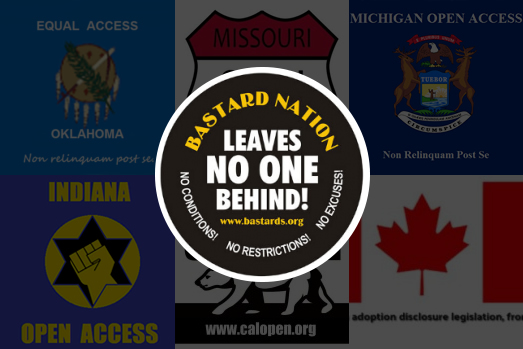Open Records – Why They’re Good for Adoptive Families
8 Common Misconceptions about Open Records for Adult Adoptees
- Is Open Records the same as Open Adoption? NO!
Open Records is NOT the same as Open Adoption. Open Records refers to an adult adoptee having equal access to legal documents which pertain to him or her, including original birth certificate and adoption decree. Open adoption refers to an arrangement for raising an adopted child. Open records is entirely about adults and supporters of open records are not necessarily supporters of open adoption.
- Will Open Records threaten my relationship with my adoptive child? NO!
Adult adoptees having access to their records does not threaten parent-child relationships. With open records, nothing is changed while the adoptee is a child under the care of her adoptive parents Whether the relationship becomes better or worse when the adoptee is an adult depends a lot more on how parents raise their children as members of an adoptive family rather than on whether the adult adoptee has access to birth records.
- Will Open Records cause a birthparent to try to reclaim my child. NO!
Open Records are only meant for adult adoptees who have reached the age of majority. Most birth parents are not interested in attempting to rewind the clock and reconstruct a lost relationship.
- Will Open Records impinge upon a birthparent’s privacy? NO!
Birthparents do not sign a contract guaranteeing them anonymity; neither do adoptive parents. Many birthparents aren’t even aware that adoptee birth records are sealed and amended.
- Will Open Records lead to a rise in abortion? NO!
This myth has been perpetuated by anti-open records organizations and sold as a scare tactic to unsuspecting Christians and potential adoptive parents. These spurious claims are in fact contradicted by the available evidence. If you want to see for yourself and draw your own conclusions, study the available data. The fact is that in nations where adoption records have been open for decades, such as Great Britain, studies have shown that there has been no increase in abortion due to open records and if anything, rates have lowered Birthmothers are less likely to abort when records are open.
- Don’t only ungrateful, maladjusted adoptees need to search? NO!
Ever since Alex Haley, genealogy has captured the fancy of the American culture. Why is this yearning such a natural and popular thing for the rest of us, but when it comes to adoptees it’s pathological? Many high achieving, well-adjusted adoptees have a desire to search at some time in their lives. Having respect for this natural desire will only bring you and your child closer together. On the other hand, if your child does not desire to search, you should not push the issue. The issue is respect. It should be the choice of the adult adoptee.
- Isn’t Open Records a dangerous, radical experiment?. NO!
Actually sealed records is the experiment. Adoption records were only sealed in this country in the past 40 years. Adoptee records were sealed based on a then-fashionable, highly ideological conception of adoption as starting with a clean slate that is widely acknowledged to be bankrupt if not pernicious today. The same concept that justified closing records also justified not telling the adoptee he was adopted. Adoptee records have never been sealed in the state of Kansas. Records have been unconditionally open in Scotland since 1930, in Great Britain since 1976, in New Zealand since 1985 and in Alaska since the 1980’s. Many nations do not seal adoptee records at all, among them France, Mexico, Norway and Israel.
- Will Open Records cause fewer adoptions? NO!
Studies indicate that the rate of adoption is not adversely affected when adoption records are opened to adults. This is another baseless scare tactic. In Great Britain and elsewhere more adoptions took place after records were opened than would have before. Study the available data.




